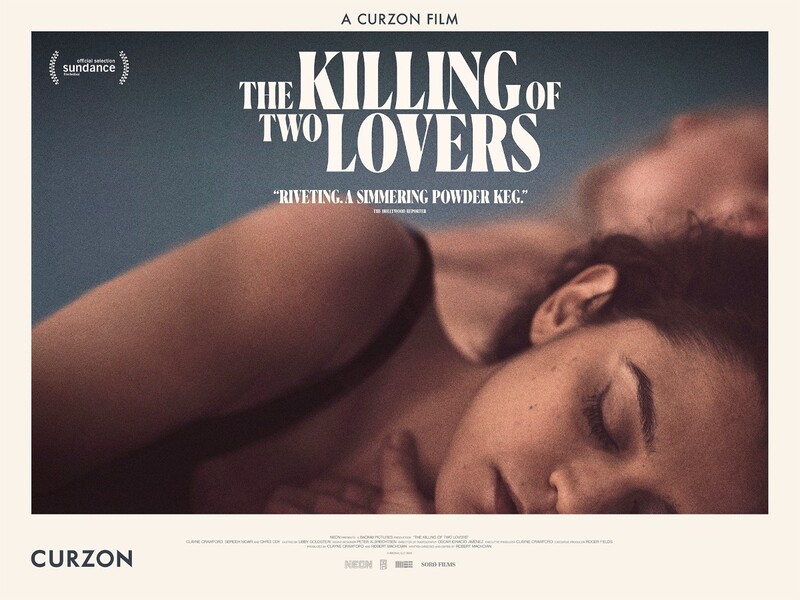
Review by
Eric Hillis
Directed by: Robert Machoian
Starring: Clayne Crawford, Sepideh Moafi, Chris Coy, Avery Pizzuto

Writer/director Robert Machoian opens his small town separation
drama The Killing of Two Lovers with what initially feels
like a flash forward to the outcome suggested by its arresting title. A
man stands over a sleeping couple, aiming a pistol at their heads.
Interrupted by a flushing toilet in a nearby room, he retreats out the
window and runs all the way to his own nearby home.
The would-be assassin is David (Clayne Crawford), and his potential
victims are his estranged wife Nikki (Sepideh Moafi) and her new
lover Derek (Chris Coy). Struggling with their marriage, David and
Nikki have agreed to a trial separation, with Nikki remaining in their
home with their teenage daughter Jess (Avery Pizzuto) and their
three young boys, while Derek has moved back in with his sickly father.

Contrary to the dramatic pose we initially find him in, Derek is doing his
best to be mature about the situation. He and Nikki have agreed that they
will date other people, a situation only Nikki has managed to avail of.
When Jess throws a tantrum about David's perceived inability to make an
effort to win back her mother, he gives her a lecture about how grownups
should behave. It's hypocritical of course, because we've just witnessed
him stalking Derek in his 4x4 earlier that same morning. Soon after he'll
be using a boxer's dummy as target practice, imagining he's aiming for the
head of Derek, or maybe even Nikki.
If you take out these key revealing scenes, which amount to a fraction of
the narrative, David comes across as a thoroughly nice guy who's genuinely
making an effort to handle this difficult situation in a mature manner. He
clearly loves his kids, and his affection is returned by his adoring boys.
Even Jess breaks her tough front at one point to give her old man a
reluctant embrace. The people of his small town all know him by name, and
if he does go through with his planned killings they'll no doubt express
their shock on the six o'clock news – "He always seemed like such a nice
man."

What's interesting about David - and what sets him apart from the
protagonists of more conventional movies about men turning to violence due
to an inability to deal with problems rationally - is that we never feel
like his murderous impulses are natural. Rather it seems David is forcing
himself to turn to violence, as though he feels it's an obligation.
Machoian would appear to be commenting on how America promotes violence as
the primary means of conflict resolution, from its war-mongering
governments right down to the common man. By committing murder, Derek will
become a stereotype, born long ago under the hot Utah sun. This town's not
big enough for two men to compete for his wife.
Machoian uses his location to great effect. An opening unbroken tracking
shot lays out just how close Derek and Nikki's separate homes are, and
whenever Derek has to take a drive the camera refuses to cut, emphasising
just how small a world he inhabits. European viewers will likely laugh at
how Derek insists on driving everywhere, even if his destination is only
two minutes away, but this is another American stereotype he's unwittingly
found himself embodying. I was reminded of how Frank Sinatra spends
The Man with the Golden Arm walking back and forth across
that Chicago street.

Most of the movie plays out in long takes, the protagonists regularly
framed at the bottom of the screen, dwarfed by an indifferent landscape.
As they argue and carry out their petty human dramas, the Utah mountains
refuse to stir, like a house cat that's heard it all before. But it's that
indifference of the natural world that makes this story so tragic and so
human. Derek and Nikki are merely squabbling ants whose personal troubles
don’t amount to a hill of beans in the grand scheme of things, but if
Derek pulls the trigger they'll suddenly become relevant, a historical
footnote, the most famous people to ever live and die in their small town.
The tragedy is that the modest Derek has no such interest in such infamy,
but his culture has convinced him that it's the only way for him to react.
Even the language used by Jess, who urges her father to "fight", is
clouded in violent symbolism. It's telling that the only time we get
close-ups is the one scene where Derek and Nikki enjoy a brief reminder of
how things once were, as they sit in his truck while he sings a song he
wrote to express his feelings.
I can't say I've ever watched the Lethal Weapon TV series,
in which Crawford plays the Mel Gibson role, so for me he proved something
of an exciting discovery here. His performance keeps you glued as David
wrestles his demons, an affable Jekyll trying to keep his Hyde under
control. But this isn't a case of Hyde inevitably taking over, rather of
Jekyll feeling obliged to step aside and reluctantly let a violent
alter-ego take charge. The Hyde of this tale wasn't created by knocking
back a potion, but by America's refusal to evolve from its Wild West
morality.

The Killing of Two Lovers is in UK
cinemas and on Curzon Home Cinema from June 4th.

